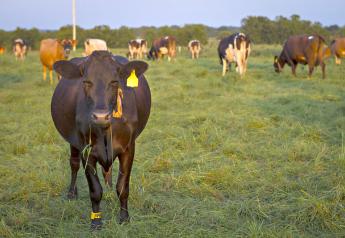Livestock Poisoning Possible from Wilting Black Wild Cherry Leaves

Severe thunderstorms developed across southwest Michigan Friday morning, July 7, 2017, with high winds causing widespread damage to trees, homes and other structures. As growers are out cleaning up storm damage, Michigan State University Extension advises livestock producers to be aware that some of the storm-damaged trees may pose a livestock poisoning risk.
The leaves of wild black cherry trees, which are a very common fencerow and woodlot species in southwest Michigan, can cause a lethal poisoning risk if grazing animals consume wilted leaves. The toxic component in the leaves is prussic acid, a hydrogen cyanide toxin that is only formed when glycosides in the leaves are combined with hydrolytic enzymes. Under normal circumstances, the two components are stored in separate tissues, but can become poisonous in storm-damaged wilted cherry leaves.
 With tornadoes, it is possible for branches to be carried quite some distance. We would encourage producers to check branches and trees down in their pastures to make sure that wild cherry is not in areas that livestock can get access to.
With tornadoes, it is possible for branches to be carried quite some distance. We would encourage producers to check branches and trees down in their pastures to make sure that wild cherry is not in areas that livestock can get access to.
“Cattle Grazing: Summer Storms and Wild Cherry Trees,” written by Ohio State University Extension educator Rory Lewandowski and published at Dairy Herd, states that as little as 1.2 to 4.8 pounds of wilted black cherry leaves could constitute a lethal dose for a 1,200 pound dairy cow. To protect grazing livestock, limbs with wilted leaves should be removed from pasture areas. Lewandowski recommends the animals be removed from the pastures until the damaged black cherry branches have been removed or the leaves become dried up and turn completely brown.
Read the full article, “Cattle Grazing: Summer Storms and Wild Cherry Trees,” for more information on the cyanic poisoning potential from wilted black cherry leaves.







